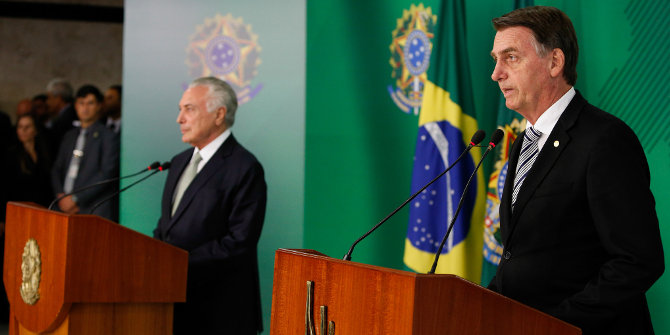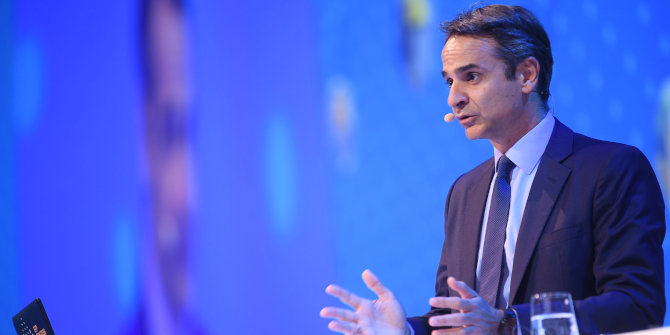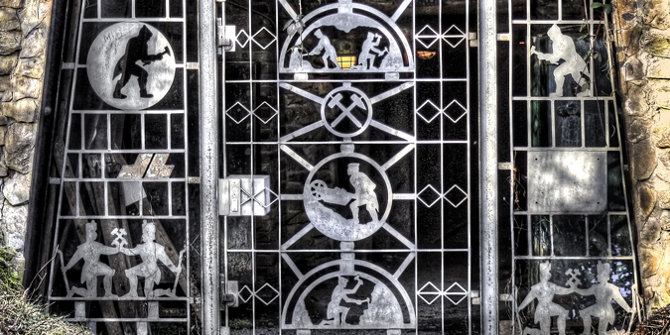 Earlier this year, recordings emerged of the leader of Poland’s ruling Law and Justice party discussing a lucrative construction project. Aleks Szczerbiak writes that despite the Polish opposition hoping the case might damage the government’s political appeal, Law and Justice retains credibility among its core supporters and the circumstances surrounding the revelations are too complex for them to be a political game changer.
Earlier this year, recordings emerged of the leader of Poland’s ruling Law and Justice party discussing a lucrative construction project. Aleks Szczerbiak writes that despite the Polish opposition hoping the case might damage the government’s political appeal, Law and Justice retains credibility among its core supporters and the circumstances surrounding the revelations are too complex for them to be a political game changer.
At the end of January, Jarosław Kaczyński, the leader of Poland’s ruling right-wing Law and Justice (PiS) party, found himself on the defensive when the liberal-left ‘Gazeta Wyborcza’ newspaper published transcripts from secret recordings of his summer 2018 discussions with Gerald Birgfellner, an Austrian businessman and one of his distant relatives. Although he does not hold any formal state positions, Mr Kaczyński exercises a powerful behind-the-scenes influence in determining the government’s programmatic and strategic priorities. The so-called ‘Kaczyński tapes’ record a discussion where Mr Birgfellner complained that he had not been paid for his work on a project to build a skyscraper in the centre of Warsaw, at a total estimated cost of 1.3 billion złoties, dubbed the ‘K-Towers’.
The land for the potential development was owned by a company called Srebrna which was founded in the mid-1990s by the Centre Agreement (PC) party, a forerunner of Law and Justice. Srebrna is majority-owned by the Lech Kaczyński Institute (ILK), which was created to commemorate the ruling party leader’s twin brother and former Polish President who died in a 2010 plane crash. Mr Kaczyński is on the supervisory board of the Institute, which was to locate a museum dedicated to his brother in the building and would earn income generated from renting out the remaining space. The financing for the K-Towers project was to come from Poland’s second largest bank, the state-controlled Pekao SA.
In the tapes, Mr Kaczyński explained that the project had to be stopped because it was too risky from a political perspective if Law and Justice was linked to the building of a skyscraper in central Warsaw. He also complained that Warsaw city council – controlled by the liberal-centrist Civic Platform (PO), currently the main opposition grouping and Poland’s ruling party between 2007-15 – refused to issue a construction permit. Mr Kaczyński said that he had no control over the Srebrna management and recommended that Mr Birgfellner take legal action, believing that this was the only way he could be reimbursed.
Mr Birgfellner’s lawyers then filed a complaint against Srebrna and Mr Kaczyński to the public prosecutor’s office and, over the next few weeks, ‘Gazeta Wyborcza’ published several new documents and extracts from the recordings, including an apparent invoice for the work undertaken by the Austrian businessman. In his evidence to the public prosecutor, Mr Birgfellner also claimed that in February 2018 Mr Kaczyński had persuaded him to pass a 50,000 złoties bribe on to a former priest and member of the Lech Kaczyński Institute’s council whose consent was required for the project to go ahead.
Party leader or property developer?
The opposition seized on the leaked recordings, arguing that they showed the most important politician in the country acting as a property developer negotiating on behalf of a company of which he was not formally a board member. The tapes thereby revealed, they said, the ruling party’s true nature as a corrupt and cronyistic grouping prepared to use its power and influence over public institutions to advance partisan interests. They pointed out that the law forbade parties from engaging in business activity and obliged parliamentary deputies to declare all their interests even if they were not linked to any direct financial payments.
The government’s opponents argued that, even if nothing strictly illegal occurred, Mr Kaczyński’s actions conflicted with the spirit of the law as it was not normal practice for the leader of a political grouping with an absolute parliamentary majority to conduct property negotiations in the party’s headquarters. Srebrna, they said, was closely tied to Law and Justice’s business interests so that these could be hidden behind a political-business conglomerate without formally breaking any rules. The fact that Mr Kaczyński had complete control of the ruling party, chaired the Lech Kaczyński Institute which owns Srebrna, and placed some of his most loyal and trusted associates in senior management positions within the company meant that he could manage its assets from behind-the-scenes.
The recordings appeared to confirm, they claimed, that Mr Kaczyński was very much in charge of Srebrna, acting as its informal intermediary with Mr Birgfellner, even though he had no formal link with the company. These tangled business arrangements were a cover for the fact that Law and Justice was involved indirectly in a potentially hugely profitable construction project. The government’s opponents also argued that the fact that the head of a state-controlled bank attended meetings in the party’s headquarters to discuss loans to Srebrna represented a pathological arrangement and that no other investor would be treated in this way.
Groundless, politically-motivated sensationalism?
The government’s supporters, on the other hand, dismissed the furore surrounding the revelations as a ‘gun cap’ (‘kapiszon’, used in Polish as a metaphor for a pseudo-sensation) arguing that the opposition and its media allies’ claims were not borne out by the evidence presented in the recordings. They argued that Mr Kaczyński was involved in normal business negotiations and denied that the recordings contained evidence of anything illegal or of any wrongdoing on his part. The Law and Justice leader was within his rights as a citizen and parliamentary deputy (even as a party leader) to discuss a real estate investment, head up the Lech Kaczyński Institute’s supervisory body, and take an interest in a company owned by the foundation. Law and Justice and Srebrna were completely separate entities and there were no legal, institutional or financial links between them.
Indeed, they argued that the recordings actually testified to the Law and Justice leader’s honesty, determination to observe the law, and intent to ensure that the Lech Kaczyński Institute’s assets were not put at risk. Mr Kaczyński was willing to settle up with Mr Birgfellner but only if there was a solid legal basis with documentation setting out exactly what services the Austrian businessman had provided. Mr Kaczyński would not have benefited personally from the investment and his actions were motivated by a desire to honour his late brother’s legacy and provide the broader Law and Justice-linked milieu with a steady, long-term financial base.
The government’s supporters pointed to the fact that Mr Birgfellner appointed lawyers with opposition ties as proof that the allegations were politically motivated; notably Roman Giertych, who once led a party in a governing coalition with Law and Justice but has become one of Mr Kaczyński’s harshest critics. Mr Birgfellner’s invoice, presented by ‘Gazeta Wyborcza’ as a key piece of evidence, they said, did not fulfil formal requirements, and his recollections about the supposed bribe were too hazy. The real scandal, they argued, was the apparent politicisation of the planning process by the Civic Platform-led Warsaw city council. For its part, Pekao SA said that its practices in this case were completely normal and that it lent money in line with the banking law and its own commercial criteria.
Undermining Law and Justice’s moral legitimation?
Poland faces elections to the European Parliament in May, and a crucial parliamentary poll in the autumn. Secret tape recordings have played an important role in Polish politics in the past, perhaps most notoriously as a result of the 2014 ‘tape affair’. This drew popular anger at the cynicism and crude language revealed in conversations between senior Civic Platform-led government ministers and public figures when discussing state matters in high-end Warsaw restaurants at the taxpayers’ expense. The scandal drained the government’s support, and Law and Justice’s victory in the subsequent 2015 election was based in large part on portraying itself, in apparent contrast to its predecessor, as representing the interests and values of ordinary Poles rather than venal and self-serving political and business elites.
The ‘Kaczyński tapes’ thereby posed huge risks for Law and Justice because the party made fighting corruption and raising moral standards in public life a core element of its ethical legitimation and political appeal. They also came at a time when the ruling party had to deal with the fallout from a number of other controversies, including an alleged bribery scandal at the country’s financial regulator, and outcry over the high salaries paid to National Bank of Poland (NBP) officials. At the same time, although it was difficult to point to any direct breaches of the law, the ease with which Mr Kaczyński conducted these tough business negotiations appeared out-of-character with his image as an ascetic driven by grand political ideas and unconcerned with material wealth. The revelations thus appeared to strike at the personal credibility of Mr Kaczyński, whose leadership is a key element ensuring the cohesion of the governing camp. The opposition and its media allies hoped they would provide a knockout blow, undermining Law and Justice’s moral foundations in a spectacular way.
Reinforcing and deepening existing divisions
For sure, a February survey by the IPSOS agency for the OKO.press portal found that, by a margin of 55% to 31%, respondents felt that Mr Kaczyński’s negotiations with Mr Birgfellner were inappropriate. However, although polling trends do show some weakening in Law and Justice’s support in recent months, its popularity remains roughly where it was in 2015 and, up until now, the ‘Kaczyński tapes’ do not really appear to have damaged the ruling party. Partly, this was because the anti-Law and Justice media over-hyped the story, hinting that it could be the biggest bombshell to hit the political scene for years. But for many Poles the controversies surrounding the recordings were just too complex and contained too many nuances, and public and media interest in them faded as the news cycle moved on.
At the moment, rather than being a game changer, the ‘Kaczyński tapes’ appear to be yet another one of those issues that have simply reinforced and deepened existing political divisions. In particular, they do not seem to have had any significant impact on Law and Justice voters. The February IPSOS/OKO.press survey, for example, found that, by a margin of 77% to 13%, supporters of the ruling party felt that Mr Kaczyński had acted appropriately compared with 13% and 73% respectively among voters of other parties. Moreover, in spite of his other-wordly image, most Poles know that Mr Kaczyński is a deeply pragmatic politician and shrewd operator. For most Law and Justice supporters the negotiations appeared to be about legally securing the finances of a foundation linked to the party’s broader political milieu rather than his personal enrichment.
More critical will be the reaction of ‘softer’ Law and Justice supporters whom the party needs to win the elections. Its support among these voters may not collapse overnight, or even in the course of a few weeks, but experience suggests that the impact of high profile scandals can often be delayed, gradually chipping away at a party’s credibility until a further (sometimes relatively minor) incident or revelation acts as a tipping point that shifts the public mood very rapidly. While Law and Justice is hoping that interest in the ‘Kaczyński tapes’ will fade, they could develop a new dynamic if, for example, the public prosecutor opens up a full-blown investigation involving the Law and Justice leader; although this appears unlikely at present.
However, a key difference between the ‘Kaczyński tapes’ and the earlier ‘tape affair’ is that the latter was linked to a broader sense that Civic Platform had run out of steam and represented an out-of-touch and complacent elite disconnected from the concerns of ordinary people and tainted by scandals. In spite of its recent difficulties, Law and Justice retains credibility among many voters for having delivered on most of the flagship social spending promises that were the key to its 2015 election victory, and it has not yet reached this kind of tipping point.
Please read our comments policy before commenting.
Note: This article originally appeared at Aleks Szczerbiak’s personal blog. The article gives the views of the author, not the position of EUROPP – European Politics and Policy or the London School of Economics. Featured image credit: Elekes Andor (CC BY-SA 4.0)
_________________________________
 Aleks Szczerbiak – University of Sussex
Aleks Szczerbiak – University of Sussex
Aleks Szczerbiak is Professor of Politics and Contemporary European Studies at the University of Sussex. He is author of Poland Within the European Union? New Awkward Partner or New Heart of Europe?(Routledge, 2012) and ‘Politicising the Communist Past: The Politics of Truth Revelation in Post-Communist Poland‘ (Routledge 2018). He blogs regularly about developments on the Polish political scene at http://polishpoliticsblog.wordpress.com/





